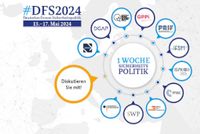 |
 | Daniel Mullis untersucht in seinem neuen Buch den Erfolg rechter Narrative in Deutschlands gesellschaftlicher Mitte und nennt Perspektiven, um der extremen Rechten entgegenzuwirken. In his new book, Daniel Mullis examines the success of right-wing narratives in the centre of German society and identifies ways to counter the far right. |
| | 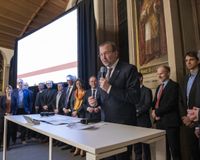 | | Am 30. Januar 2024 haben fünfzehn außeruniversitäre Forschungseinrichtungen der Rhein-Main-Region zusammen mit der Goethe-Universität ein Memorandum of Understanding für die Gründung des Wissenschaftsnetzwerks „Frankfurt Alliance“ unterzeichnet. Das Netzwerk, zu dem auch das PRIF gehört, will exzellente Forschung in der Metropolregion sichtbar machen. Mit einem Wissenschaftsfestival auf dem Frankfurter Rossmarkt stellt es sich am 28. September 2024 der Öffentlichkeit vor. On January 30, 2024, fifteen non-university research institutions in the Rhine-Main region signed a Memorandum of Understanding with Goethe University to establish the new “Frankfurt Alliance” science network. The network, to which PRIF belongs, aims to make excellent research in the metropolitan region visible. It will present itself to the public with a science festival at Frankfurt's Rossmarkt on September 28, 2024. | |
| | 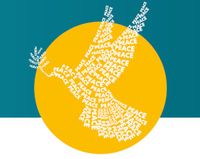 | | Antonia Witt wurde im Februar in den Beirat Zivile Krisenprävention und Friedensförderung der Bundesregierung berufen. Damit ist das PRIF weiterhin in dem Gremium vertreten. Antonia Witt wird sich dort in den Arbeitsvorhaben „Friedenspolitische Kohärenz deutscher Afrikapolitik“ sowie „Ziel- und Wirkungsanalyse der Mediation als Instrument der deutschen Außenpolitik“ engagieren. Antonia Witt was appointed to the Advisory Board to the Federal Government for Civilian Crisis Prevention and Peacebuilding in February. By this nomination, PRIF continues to be represented on the board. Antonia Witt will engage in the working projects “Peace policy coherence of German Africa policy” and “Target and impact analysis of mediation as an instrument of German foreign policy”. | |
| | 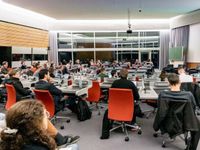 | | Das Projekt RADIS (RADIS ─ Transfervorhaben Gesellschaftliche Ursachen und Wirkungen des radikalen Islam in Deutschland und Europa) hat am 22. und 23. Februar 2024 die interdisziplinäre Fachtagung „Ursachen und Wirkungen von Islamismus in Deutschland und Europa“ in Bielefeld ausgerichtet. Im Mittelpunkt der Tagung am Bielefelder Zentrum für interdisziplinäre Forschung (ZiF) standen aktuelle Erkenntnisse aus der Radikalisierungsforschung im Phänomenbereich Islamismus sowie der Austausch mit der Fachpraxis der Extremismusprävention. Der Konferenzbericht steht auf der RADIS-Website zur Verfügung. On February 22 and 23, 2024, the RADIS project (RADIS ─ Transfer Project Social Causes and Effects of Radical Islam in Germany and Europe) hosted the interdisciplinary conference “Causes and Effects of Islamism in Germany and Europe” in Bielefeld. The focus of the symposium at the Center for Interdisciplinary Research (ZiF: Zentrum für interdisziplinäre Forschung) was on current findings from radicalization research in the field of Islamism and the exchange with experts in the field of extremism prevention. The conference report is available on the RADIS website (in German).
| |
| | 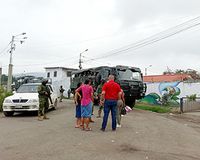 | | Um Gewaltdynamiken und politische Entwicklungen in Ecuador für die deutsche Politik einschätzbar zu machen, hat Jonas Wolff zusammen mit Elena Dressler für das Bundesministerium für wirtschaftliche Entwicklung und Zusammenarbeit (BMZ) eine Szenarioanalyse entwickelt. Das Ergebnis stellten sie bei einem internen Workshop am 14. März 2024 im BMZ vor. Jonas Wolff and Elena Dressler have developed a scenario analysis for the German Federal Ministry for Economic Cooperation and Development (BMZ) to help German policymakers assess the dynamics of violence and political developments in Ecuador. They presented the results at an internal workshop at the BMZ on March 14, 2024. | |
| |  | | Der Senat der Leibniz-Gemeinschaft hat in seiner Sitzung am 19. März 2024 neue institutsübergreifende Förderformate bewilligt, darunter auch die neuen Leibniz-Labs. Das PRIF hat sich erfolgreich an der Entwicklung der drei jetzt bewilligten Labs beteiligt. Mit dem neuen Format will die Leibniz-Gemeinschaft ihre inter- und transdisziplinäre Exzellenz stärken und diese für gesellschaftliche Herausforderungen nutzbar machen. At its meeting on March 19, 2024, the Senate of the Leibniz Association approved new cross-institute funding formats, including the new Leibniz Labs. PRIF has successfully participated in the development of the three labs that have now been approved. With this new format, the Leibniz Association aims to strengthen its inter- and transdisciplinary excellence and make it usable for social challenges. | |
| |  | | Im Mai 2024 lädt das PRIF Jugendliche aus den 17 Partnerstädten Frankfurts zur einem einwöchigen Summit, dem Global House of Young Voices, ein. Die Teilnehmenden begegnen sich als Global Citizens im Sinn der UN-Nachhaltigkeitsziele und diskutieren politische Themen, die ihren Alltag bestimmen. Der Summit endet mit einer öffentlichen Podiumsdiskussion in der Frankfurter Paulskriche am 17. Mai 2024. Das Projekt wird von der Stadt Frankfurt und der Stiftung Junge Weltbürger gefördert. In May 2024, PRIF is inviting young people from Frankfurt's 17 partner cities to a one-week summit, the Global House of Young Voices. The participants will meet as global citizens in the spirit of the UN Sustainable Development Goals and discuss political issues that affect their everyday lives. The summit will end with a public panel discussion in Frankfurt's Paulskirche on May 17, 2024. The project is funded by the City of Frankfurt and the Foundation Junge Weltbürger. | |
| |  | | Seit Februar 2024 ist Stefan Kroll Mitglied des Vorstandes, wo er neben der Wissenschaftskommunikation auch für das Programmbudget des Instituts verantwortlich ist. Der Sozialwissenschaftler ist seit 2018 am PRIF tätig und koordinierte dort zunächst den Leibniz-Forschungsverbund „Krisen einer globalisierten Welt“. Seit 2021 ist er Leiter der Abteilung für Wissenschaftskommunikation. Stefan Kroll has been a member of the Executive Board since February 2024, where he is responsible for science communication and the institute's program budget. The social scientist has been working at PRIF since 2018 initially coordinating the Leibniz Research Alliance “Crises in a Globalized World”. He has been Head of the Science Communication Department since 2021. | |
| | 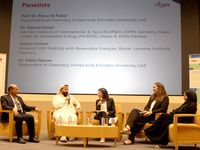 | | Irene Weipert-Fenner forscht zu Grünem Wasserstoff in arabischen LändernIm Rahmen der Arab German Young Academy (AGYA) forscht Irene Weipert-Fenner zu den Implikationen der Produktion von Grünem Wasserstoff in arabischen Ländern und des Exports nach Europa. Am 5. März 2024 moderierte sie für AGYA eine Podiumsdiskussion an der United Arab Emirates Universität in Al Ain/Vereinigte Arabische Emirate, bei der Expert*innen aus Natur- und Sozialwissenschaften das Potential einer deutsch-arabischen Kooperation für den Aufbau einer nachhaltigen Energiewirtschaft kritisch diskutierten. Irene Weipert-Fenner Researches on Green Hydrogen in Arab CountriesAs part of the Arab German Young Academy (AGYA), Irene Weipert-Fenner conducts research on the implications of the production of green hydrogen in Arab countries and its export to Europe. On March 5, 2024, she moderated a panel discussion for AGYA at the United Arab Emirates University in Al Ain/United Arab Emirates, in which experts from the natural and social sciences critically discussed the potential of German-Arab cooperation for the development of a sustainable energy industry. | |
| |  | | Stefan Kroll spricht auf Konstanzer SymposiumAm 21. und 22. März nahm Stefan Kroll als Referent an dem 43. Konstanzer Symposium teil, das dem Thema „Deutschland und die Welt im Krisenmodus – Ist unsere Verfassung für die Herausforderungen unserer Zeit gerüstet?“ gewidmet war. Die seit 1980 jährlich stattfindende rechtspolitische Tagung des baden-württembergischen Justizministeriums richtet sich an Vertreter*innen aus Politik, Wissenschaft, Justiz, Wirtschaft und Medien. Stefan Kroll Speaks at Constance SymposiumOn March 21 and 22, Stefan Kroll took part as a speaker at the 43rd Constance Symposium that was dedicated to the topic "Germany and the world in crisis mode - Is our constitution equipped for the challenges of our time?". This annual legal policy conference of the Baden-Württemberg Ministry of Justice addresses representatives from politics, science, justice, business and the media and has been held since 1980. | |
| |  | | Hendrik Simon ist im April am Institute of European Studies (IES) der University of California (UC) Berkeley zu Gast. Zusammen mit Matthew Specter forscht er zu den Themen Krieg und internationale Ordnung sowie zur Geschichte der deutschen Friedensforschung. Am IES stellt er auch sein neues Buch „A Century of Anarchy? War, Normativity, and the Birth of Modern International Order“ vor. In April, Hendrik Simon is a visiting scholar at the Institute of European Studies (IES) at the University of California (UC) at Berkeley. Together with Matthew Specter, he is working on the topics of war and international order as well as the history of German peace research. During his stay at the IES he also presents his forthcoming book “A Century of Anarchy? War, Normativity, and the Birth of Modern International Order”. | |
| |  | | Veronika Klymova beginnt im CBWNetSeit März 2024 arbeitet Veronika Klymova für das Kompetenznetzwerk zur Stärkung der Normen gegen chemische und biologische Waffen CBWNet, das im Programmbereich „Internationale Sicherheit“ angesiedelt ist. Zu ihren Forschungsinteressen gehören die Konzeptualisierung von Normen und der Einsatz von Künstlicher Intelligenz in der Rüstungskontrolle. Veronika Klymova hat Internationale Beziehungen in Genf sowie Internationale Entwicklung in Birmingham studiert und für die Internationale Organisation für Migration gearbeitet. Veronika Klymova Joins the CBWNetSince March 2024, Veronika Klymova has been working for CBWNet, the competence network for a reinforcement of norms against chemical and biological weapons, in the Research Department “International Security”. Her research interests include the conceptualization of norms and the use of artificial intelligence for arms control. Veronika Klymova studied International Relations and International Development in Geneva and Birmingham. She also worked for the International Organization for Migration. | |
| |  | | Jonatan Kurzwelly startet mit DFG-ProjektJonatan Kurzwelly hat im April die Arbeit an seinem von der Deutschen Forschungsgemeinschaft (DFG) geförderten Projekt „Widersprüche in Deradikalisierungsprozessen“ am PRIF-Programmbereich V aufgenommen. Zugleich leitet er ein interdisziplinäres Forschungsprojekt zum Umgang mit menschlichen Überresten in institutionellen Sammlungen, das vom Network of European Institutes for Advanced Study finanziert wird. Der Sozial- und Kulturanthropologe hat ein ausgeprägtes Interesse an Philosophie. In den letzten zehn Jahren forschte er in England, Deutschland, Namibia, Paraguay, Polen, Südafrika, Schottland und Spanien. Seit 2022 ist er assoziierter Forscher des PRIF. Jonatan Kurzwelly Starts with DFG ProjectIn April, Jonatan Kurzwelly began work on his research project “Contradictions in deradicalization processes” at PRIF’s Research Department V, funded by the German Research Foundation (DFG). At the same time, he is leading an interdisciplinary research project on the handling of human remains in institutional collections, which is funded by the Network of European Institutes for Advanced Study. The social and cultural anthropologist has a vested interest in philosophy. Over the past ten years, he has conducted research in England, Germany, Namibia, Paraguay, Poland, South Africa, Scotland and Spain. He has been an associate researcher at PRIF since 2022. | |
| | 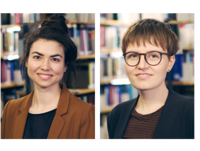 | | Vorstand begrüßt neue ReferentinnenSeit dem 1. Februar unterstützen Yvonne Blum und Laura Friedrich den Vorstand als Wissenschaftliche Referentinnen. Beide haben bereits zuvor am PRIF als Referentinnen für Wissenstransfer gearbeitet und seit 2020 den Aufbau der Abteilung Wissenschaftskommunikation unterstützt. Weitere Stationen in den Bereichen Wissenstransfer und Wissenschaftsmanagement waren das Forschungsinstitut Gesellschaftlicher Zusammenhalt, das Forschungszentrum Normative Ordnungen und der Fachbereich Wirtschaftswissenschaften der Goethe-Universität Frankfurt. Yvonne Blum hat einen Magisterabschluss in Theater-, Film- und Medienwissenschaften und Germanistik, Laura Friedrich studierte Germanistik und Anglistik mit einem Schwerpunkt auf Kultur-, Ideen- und Sozialgeschichte. Executive Board Welcomes New AdvisorsSince February 1, Yvonne Blum and Laura Friedrich are supporting PRIF’s Executive Board as Advisors. Both previously worked at the Institute as Knowledge Transfer Officers and have supported the establishment of the Science Communication department since 2020. Other positions in the areas of knowledge transfer and science management included working at the Research Institute Social Cohesion, the Research Centre Normative Orders and the Faculty of Economics and Business at Goethe University Frankfurt. Yvonne Blum holds a master's degree in Theatre, Film and Media Studies and German Literature, Laura Friedrich studied German Literature and English Studies with a focus on cultural history, social history and the history of ideas. | |
| |  | | Patrizia Stoye ergänzt PRIF-TeamSeit Mitte Februar ist Patricia Stoye als Büromanagerin für die Institutsleitung und den Programmbereich II im Einsatz. Nach ihrem Diplom in Politologie im Jahr 2010 war sie in verschiedenen Rollen im NGO-Bereich tätig, zuletzt seit 2015 als Shop-Referentin für Oxfam Deutschland. Patricia hat Politikwissenschaften mit einem Schwerpunkt auf internationalen Institutionen sowie Organisationsforschung an der Goethe-Universität Frankfurt studiert. Patrizia Stoye Joins PRIF TeamPatricia Stoye joined the PRIF in mid-February as Office Manager for the Executive Board and Research Department II. After graduating in political science in 2010, she worked in various roles in the NGO sector, most recently as a store officer for Oxfam Germany since 2015. Patricia studied political science with a focus on international institutions and organizational research at Goethe University Frankfurt. | |
| |  | | Forschung zu China und Global Governance Xinyu Yuan, Postdoc und Gastdozentin am Geneva Graduate Institute in der Schweiz, widmete sich während ihres Gastaufenthaltes am PRIF im Februar 2024 zwei Projekten: Zum einen ging sie der Frage nach, wie aufstrebende Mächte, u. a. China, Japan und Russland, Praktiken der Friedenskonsolidierung anwenden. Zum anderen untersuchte sie schrumpfende zivile Räume sowie die Aktivitäten der internationalen Zivilgesellschaft in China. Research on China and Global GovernanceXinyu Yuan, postdoctoral researcher and visiting lecturer at the Geneva Graduate Institute in Switzerland, devoted herself to two projects during her stay as PRIF guest researcher in February 2024: Firstly, she explored how emerging powers, such as China, Japan and Russia, apply peacebuilding practices. Secondly, she examined shrinking civic spaces as well as the activities of international civil society in China. | |
| |  | | Selma Kropp forscht zu KinderrechtenWährend ihrer Zeit als Gastforscherin untersucht Selma Kropp, wie Kinderrechte in regionalen Organisationen institutionalisiert werden, welche Rolle regionale Bürokraten in diesem Prozess spielen und welche Rückkopplungseffekte auf UN-Ebene auftreten. Die Doktorandin am European University Institute in Florenz hält sich von März bis Mai 2024 am PRIF auf. Selma Kropp Researches Children's RightsDuring her time as a visiting researcher, Selma Kropp is investigating how children's rights are institutionalized in regional organizations, what role regional bureaucrats play in this process and what feedback effects occur at UN level. The doctoral student at the European University Institute in Florence will be at PRIF from March to May 2024. | |
| |  | | Patrick Flamm und Hendrik Simon haben am PRIF den neuen Arbeitskreis „Sozial-ökologische Transformationskonflikte“ initiiert, der im April mit der gleichnamigen Reihe des PRIF-Blog gestartet ist. Im Insight-Interview erklären sie, warum sie sich als Konfliktforscher mit der sozialökologischen Transformation beschäftigen. Patrick Flamm and Hendrik Simon initiated the PRIF working group “Socio-ecological Transformation Conflicts” in April. It has started with a new blog series of the same name. In their interview, they explain why they see the socio-ecological transformation as a field of study for conflict researchers. | |
| |  | | Nicole Deitelhoff, Peter R. Neumann und Susanne Wasum-Rainer sprechen am 29. April 2024 in der Evangelischen Akademie Frankfurt darüber, was diplomatische Verhandlungen im aktuellen Krieg in Gaza bewirken können. Die Veranstaltung, die auch im Livestream übertragen wird, ist Teil der Reihe „Wie wieder Frieden“ der Polytechnischen Gesellschaft. On April 29, Nicole Deitelhoff, Peter R. Neumann and Susanne Wasum-Rainer will speak at Evangelische Akademie Frankfurt about the influence diplomatic negotiations can have in the current war in Gaza. The event is part of the Polytechnische Gesellschaft's “Wie wieder Frieden” series and will also be livestreamed. Kommende Veranstaltungen / Upcoming Events: - Der Aufstieg der Rechten in Krisenzeiten & Law statt Order, Doppelbuchvorstellung mit Daniel Mullis und Maximilian Pichl, 23. April 2024.
- Transformation politischer Gewalt – Eine interdisziplinäre Einführung, Start der TraCe Ringvorlesung 2024: Gewalt als Globale Herausforderung, 24. April 2024.
- Zukunft der Demokratie, Panel des F.A.Z.-Kongresses mit Nicole Deitelhoff, 26. April 2024
- In bester Verfassung?!, Podiumsdiskussion der Kampagne „Frankfurt – Hauptstadt der Demokratie“ mit Nicole Deitelhoff, 5. Mai 2024.
- Der breite militärische Einsatz von KI – Auswirkungen auf Taktik, Stabilität und Rüstungskontrolle, Dritter Vortrag der TraCe-Ringvorlesung 2024, mit Niklas Schörnig, 15. Mai 2024.
- Kann es Frieden geben im Nahen Osten?, Vortrag von Claudia Baumgart-Ochse, mit Livestream, 16. Mai 2024.
- Nachhol-Termine der RADIS-Ringvorlesung in Leipzig, immer ab 19:00 Uhr, mit Livestream:
Radikalisierende Räume. Kontexteffekte auf die Anfälligkeit für Radikalisierung, mit Prof. Dr. Sebastian Kurtenbach/Radikalisierende Räume (RadiRa), Fachhochschule Münster, 15. Mai 2024; Radicalized Mainstream: Mobilizing, Normalizing and Normativizing Far-right Ideologies from the Centre, mit Prof. Dr. Sabrina Zajak/Vom Rand in die Mitte: Rechtspopulistische Deutungen des Islams als gesellschaftliche Herausforderung in Deutschland, Europa und beyond (RaMi), Deutsches Zentrum für Integrations- und Migrationsforschung (DeZIM), 26. Juni 2024.
Livestreams zum Nachhören und -sehen / Livestreams of Former Events - Folge 2 der Reihe „A mentsh is a mentsh. Kunst & Kultur nach dem 7. Oktober“, Bundeskunsthalle Bonn, mit Nicole Deitelhoff, 12. März 2024.
- Artificial Intelligence in the Military Domain: Technical, Legal and Ethical Perspectives, VCDNP-Webinar, u. a. mit Elisabeth Hoffberger-Pippan und Thomas Reinhard, 26. März 2024.
- Lehren aus dem Völkermord in Ruanda, Online-Veranstaltung der Heinrich-Böll-Stiftung, mit Anton Peez, 18. März 2024.
- Der Krieg in Gaza. Wie kann man weitere Eskalationen verhindern? Podiumsdiskussion, Haus am Dom, mit Nicole Deitelhoff, 20. Februar 2024.
- RADIS-Ringvorlesung „Islamismus in Deutschland und Europa: Gesellschaftlicher Umgang mit Ursachen und Wirkungen“, alle Folgen des Jahres 2023.
| |
| | 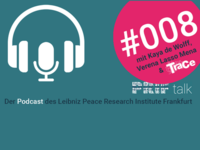 | | Kaya de Wolff und Verena Lasso Mena vom Forschungszentrum „Transformations of Political Violence“ (TraCe) sprechen mit Tina Cramer über ihre Feldforschung zu Umweltaktivismus und sozialen Medien in Brasilien. Sie beschreiben, was „Research in Solidarity“ für sie bedeutet. Kaya de Wolff and Verena Lasso Mena from the research center “Transformations of Political Violence” (TraCe) talk to Tina Cramer about their field research on environmental activism and social media in Brazil. They describe what “Research in Solidarity” means to them. (In German) | |
| | 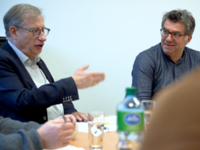 | | Welche Bedeutung haben Ressentiments für die Gesellschaft? Mouhanad Khorchide, Levent Tezcan und Özkan Ezli beschreiben den Forschungsansatz des Projekts „Ressentiment“ und stellen erste Ergebnisse vor. Weitere Videos der RADIS-Forschungsprojekte sind auch in englischer Sprache verfügbar. What significance does resentment have for society? In the video (in German), Mouhanad Khorchide, Levent Tezcan and Özkan Ezli describe the research approach of the "Ressentiment" project and present initial results. Further videos of the RADIS research projects are also available in English. | |
| |  | | Die deutsche Beteiligung am UN-Einsatz in Mali wurde bis 2023 immer wieder verlängert, obwohl die Erfolgsaussichten sanken. Im neuen PRIF Report untersucht Thorsten Gromes, mit welchen Argumenten der Bundestag den Einsatz rechtfertigte. Germany's participation in the UN mission in Mali was repeatedly extended until 2023, even though the prospects of success were diminishing. In the new PRIF Report, Thorsten Gromes examines the arguments used by the Bundestag to justify the mission. (In German) Weitere Neuerscheinungen (Auswahl) / Further New Publications (selected): - Abay Gaspar, Hande/Junk, Julian/Sold, Manjana/Süß, Clara-Auguste (2024): Co-escalation in Contentious Politics and Radicalization, PRIF Working Papers No. 62, Frankfurt/M.
- Pfeifer, Hanna/Weipert-Fenner, Irene/Williams, Timothy (2024): Israel-Gaza jenseits des Genozid-Begriffs: Massengewalt gegen Zivilist*innen jetzt beenden, PRIF Blog, 21.3.2024.
- Deleglise, Dimpho (2024): Potentially Vital AU Meeting on Tigray Leaves Communities of Interest in the Dark, PRIF Blog, 15.3.2024.
- Ferl, Anna-Katharina/Perras, Clara (2024): Beyond the Code. Unveiling Gender Dynamics in AI and Cybersecurity for International Security, PRIF Spotlight 2/2024, Frankfurt/M.
- Alema, Alema/Demirci, Irem/Wisotzki, Simone (2024): Zum Internationalen Frauentag: Die Situation von Frauen in Afghanistan, PRIF Blog, 8.3.2024.
- Kreuzer, Peter (2024): Localization of Fatal Police Violence. Evidence from the Philippines, PRIF Spotlight 1/2024, Frankfurt/M.
- Kuhn, Frank/Hoffberger-Pippan, Elisabeth (2024): Court Orders Dutch Government to halt the Export of F-35 Parts to Israel: Implications for the War in Gaza and Beyond, PRIF Blog, 6.3.2024.
- Wiegold, Lars (2024): Forschung ohne Praxis?! Ein Überblick aktueller Entwicklungen und ein „Was wäre, wenn?“-Gedankenspiel, PRIF Blog, 29.2.2024.
- Bühring, Lena/Gräfe, Markus (2024): Quantentechnologie und ihre Sicherheitsrelevanz, CNTR Fact Sheet, 29.2.2024.
- Driedger, Jonas J. (2024): Was in der Zukunft der Ukraine liegt: Plädoyer für eine Verteidigungs- und Resilienzstrategie, PRIF Blog, 23.2.2024.
- Ahmed, Reem/Klöckner, Mona/Sold, Manjana (2024): How Can Research on Topics Surrounding Radicalization, Extremism, and Terrorism be Safe and Socially Sustainable?, PRIF Blog, 8.2.2024.
- Kopp, Rita Theresa (2024): Easier Said Than Done: The Political Discourse About Indigenous-Settler Reconciliation in Canada, PRIF Report 1/2024.
Auf unserem PRIF Blog erscheint fortlaufend eine große Zahl neuer Beiträge. / A large number of new posts appear on PRIF Blog on an ongoing basis. | |
| |  | | Das von Linda Schlegel and Rachel Kowert herausgegebene Buch untersucht die Verbreitung extremistischer Propaganda durch digitale Spiele. The book, edited by Linda Schlegel and Rachel Kowert, examines the spread of extremist propaganda through digital games. Weitere Neuerscheinungen (Auswahl) / Further New Publications (selected): - Ben Aharon, Eldas (2024): ‘Profiles in intelligence’: An Interview with 8th Mossad Chief Danny Yatom. Intelligence and National Security, 1–15.
- Polianskii, Mikhail (2024): Russian Foreign Policy Research and War in Ukraine: Old Answers to New Questions? In: Communist and Post-Communist Studies 1–17.
- Mannitz, Sabine/Sunier, Thijl (2024): Civil Enculturation in The Netherlands, Britain, Germany, and France. A Look Back and Ahead, in: Gilliam, Laura/Markom, Christa (eds), Difference and Sameness in Schools. Perspectives from the European Anthropology of Education, Oxford/New York: Berghahn, 295–318, https://www.berghahnbooks.com.
- Stritzke, Laura (2024): What Do We Mean When Speaking about “Radicalization”? – Reflections on the Use of a Contested Term, VORTEX Blog, 4.3.2024.
- Flamm, Patrick/Kroll, Stefan (2024): Environmental (In)Security, Peacebuilding and Green Economic Recovery in the Context of Russia’s War against Ukraine, in: Environment and Security, 1–26.
- Pfeifer, Hanna (2024): Sichtbarkeitsregime revolutionieren. Antwort auf Patricia Hayes’ “Fanie Jason: Shifting the Ground of the Image”, in: van Rahden, Till/Völz, Johannes (Hg.), Horizonte der Demokratie. Offene Lebensformen nach Walt Whitman, Bielefeld: transcript, 113–117.
- Stephanblome, Isabelle (2024): Unvollständige Erinnerung. Kontinuitäten rechtsextremer Gewalt in Deutschland, Bundeszentrale für politische Bildung, 26.1.2024.
Zur Liste der aktuellen Publikationen / To the latest publications | |
| | Weitere Medienbeiträge sind auf dem PRIF-Presseportal zu finden. // Further media contributions can be found on PRIF's press portal. - Genozid: Was Deutschland aus Ruanda gelernt hat, Interview mit Sarah Brockmeier-Large, 3. April 2024.
- Ostermärsche: Aus der Zeit gefallen oder nötiger denn je?, NDR Info, mit Jonas J. Driedger, 27. März 2024.
- Der Terror in Russland und die Folgen, Fernsehbeitrag mit Nicole Deitelhoff, 3sat, 25. März 2024.
- Rasche Raketenabwehr: Generalinspekteur treibt die Regierung zur Eile an, Artikel mit Frank D. Kuhn, Merkur, 25. März 2024.
- Expertos analizan relaciones que existen entre élites económicas y esfera del poder político, Interview mit Jonas Wolff (auf Spanisch), Otra Mirada, 19. März 2024.
- KI in der Konfliktprävention: Hoffnungen und Bedenken, Artikel mit Thomas Reinhold, indeon, 18. März 2024.
- Viele Putin-Kritiker in russischen Großstädten, Interview mit Mikhail Polianskii, rbb24, 2. März 2024.
- Für fast 600 Millionen Euro: Bundeswehr bestellt Flugabwehr-Panzer aus Werk in Kassel, Artikel mit Niklas Schörnig, Tagesschau, 29. Februar 2024.
- Wie positionieren sich BRICS-Staaten zum Nahostkonflikt?, Interview mit Stefan Kroll, Deutsche Welle, 23. Februar 2024.
| |
|
|
Sie möchten den Newsletter in Zukunft nicht mehr empfangen? Dann klicken Sie bitte hier.
To unsubscribe from the newsletter please click here. |
|
|








